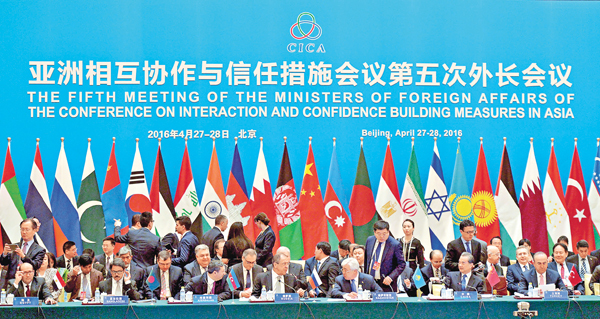 放大圖片 放大圖片
■會議4月28日在北京開幕,亞洲各國領袖出席。 資料圖片
原文:亞洲相互協作與信任措施會議第五次外長會議4月28日在北京開幕,國家主席習近平出席開幕式並發表講話(delivered a speech )。
由於歷史原因和現實利益(historical ties and conflicts of interest),亞洲局部地區存在影響和平發展的因素,但是亞洲國家和人民有能力、有智慧通過對話協商(dialogues),和平解決爭議(petty differences ),走出一條共建共享共贏的亞洲安全之路。
對話互信破不明朗地區因素
亞信成立以來,順應世界多元化和區域一體化(diversity and regional integration)歷史趨勢,促進各國互信與協作,探索符合亞洲特點和各國共同利益的安全與發展道路。中國是亞洲和世界的大國,奉行和平外交政策,始終是國際和地區安全的維護者、建設者、貢獻者。
中國堅持和平發展,維護以聯合國憲章宗旨和原則為核心的國際秩序,推動構建以合作共贏為核心的新型國際關係。2014年亞信上海峰會上,中方倡議樹立共同、綜合、合作、可持續的亞洲安全觀,發展合作共贏的新型夥伴關係,構建亞洲命運共同體。
不可否認,亞洲安全存在一些不明朗因素(security hotspots),包括朝鮮半島、南海問題、阿富汗、敘利亞、巴以等問題,均受到國際社會高度關注(deep concerns)。中國強調以對話增互信,以對話解紛爭,以對話促安全,這也是中國與亞洲國家長期以來形成的相互尊重、協商一致、照顧各方的「亞洲方式」,對化解(resolving )爭端行之有效。
屢挑撥圖放大小衝突
但是,近年有域外國家為鞏固全球霸主地位(global hegemony),不斷插手(intervenes )亞洲事務,在朝鮮半島、南海問題上表現尤為過分,一方面在亞洲派駐強大軍力,製造緊張氣氛,另一方面拉幫結派,建立軍事同盟,慫恿有領土主張的國家向聯合國、國際法庭求援,企圖將問題「國際化」。
正是由於這種挑撥下( provocations),亞洲領土爭議、地區衝突被小事化大(magnified),和平發展的前景蒙上陰影。亞洲國家必須防範域外國家不懷好意插手本地事務,更不應邀請外力介入干預,以免地區問題變得更複雜。
亞洲是全球經濟增長最快的地區,區域合作和一體化進程方興未艾,保持和平穩定有利於亞洲及全世界。亞洲的安全要靠各成員國共同維護,發展要靠各成員國共同促進。若有國家假手外人,借助外力,不僅對解決爭端於事無補,反而會被綑綁上他人的「戰車」,最終讓自己和亞洲蒙受傷害。個中利弊,值得各國當政者明察。 (摘錄自文匯報社評29-4-2016) (標題及小題為編輯所加)
Learning point
亞洲相互協作與信任措施會議(簡稱亞信會議)是一個亞洲多國參與的論壇,於1992年由哈薩克斯坦在聯合國大會上提出建議定期召開,原意是為了加強各國於地區安全方面合作,在亞洲建立安全保障機制以共同打擊地區恐怖主義。
中國積極主導後美國時代
除中國、韓國、印度、巴基斯坦等東、南亞軍事強國,成員國亦包括俄羅斯、以色列和土耳其等近東國家,甚至有曾被時任美國總統喬治布殊指為邪惡軸心(Axis of Evil)的伊朗。而美國及其東亞重要盟友日本,亦以觀察員國身份參加會議。雖然亞信會議雲集不同陣營的國家,但在2001年美國911恐怖襲擊(9/11,讀成nine eleven)前,一直未曾召開會議。
中國近年漸漸崛起,再加上成為會議主席國,因此北京主動在亞信擔任積極角色,借其展現中國和平崛起對亞洲各國之利益,並說服各國接受以中國主導亞洲安全的後美國時代(post-American era)。所以今時今日亞信會議上,習近平提出要「構建亞洲特色安全新秩序」,可以說是中國政治和外交手段之延伸。
No foreign hand needed in keeping Asian peace
譯文:The 5th Meeting of the Ministers of Foreign Affairs of the Conference on Interaction and Confidence-Building Measures in Asia (CICA) was held in Beijing on 28 April, 2016. Chinese President Xi Jinping delivered a speech at its opening.
Due to historical ties and conflicts of interest, risk factors endangering peaceful development might exist in certain regions in Asia. However, the nations and peoples of Asia certainly possess the wisdom and the ability to put away their petty differences through dialogues, and would ultimately build the road to security in Asia through commitment and mutual trust.
Resolve opacities via dialogues
The CICA has been adhering to the world trend in terms of diversity and regional integration since its inception by promoting mutual trust and cooperation between Asian countries. The inter-governmental forum also explores the Asian pathway to security and development while striking a balance between the interests of participating countries. As a regional and world power, China is truly the champion of regional and international security, one who has been pursuing a foreign policy of peace.
Adhering to the principle of peaceful development, China has also been maintaining the international order that has the purposes and principles of the UN Charter at the core. She has also been promoting a new-type international relationship that features cooperation and reciprocity. The role of China in promoting international cooperation can be demonstrated in the CICA Shanghai Summit in 2014, where President Xi proposed his vision on a common, comprehensive, cooperative and sustainable security in Asia, and called for joint efforts to explore an inclusive and win-win approach to Asian security that is for all and by all.
Undeniably, security hotspots exist in Asia. North Korea, the South China Sea, Afghanistan, Syria and Israel have attracted deep concerns from the international community. China stresses the importance of dialogues in international relations.This "Asian way", formed out of long term respect and coordination with our neighbors, has proven to be particularly effective in resolving disputes.
Provocations enlarging disputes
However in recent years, an outsider persistently intervenes Asian affairs in an attempt to consolidate its own global hegemony. This is especially apparent in both the Korean Peninsula and the South China Sea, as this outsider stirs up tension by increasing its garrison in the area while forming military alliances with countries in the region. Besides, it also attempts to internationalise local conflicts by inciting countries with territorial claims to escalate the issues to the United Nations and the International Court of Justice.
Under the influence of such foreign provocations, territorial disputes and local conflicts in Asia are often magnified, clouding the prospect of peaceful development in the region. Asian countries must be vigilant against such foreign influence on domestic affairs. It is also imperative that no foreign powers be invited in order to prevent complexities in regional problems.
Asia is the fastest growing economy in the world.There is still a lot of potential for regional cooperation and integration. Peace and stability in Asia would be beneficial to both the region and the globe. It would take a combined and coordinated effort between Asian countries to achieve security and development.
Any attempt to invite foreign powers into the regional play would only bring a foreign yoke on Asian neck, with detrimental effects brought onto not only the inviter, but the whole of Asia. Leaders of Asian countries must weigh the consequences of such an action. (Excerpted from WWP editorial April 29)■Jeffrey Tse [ywc_jeffrey@hotmail.com]
|